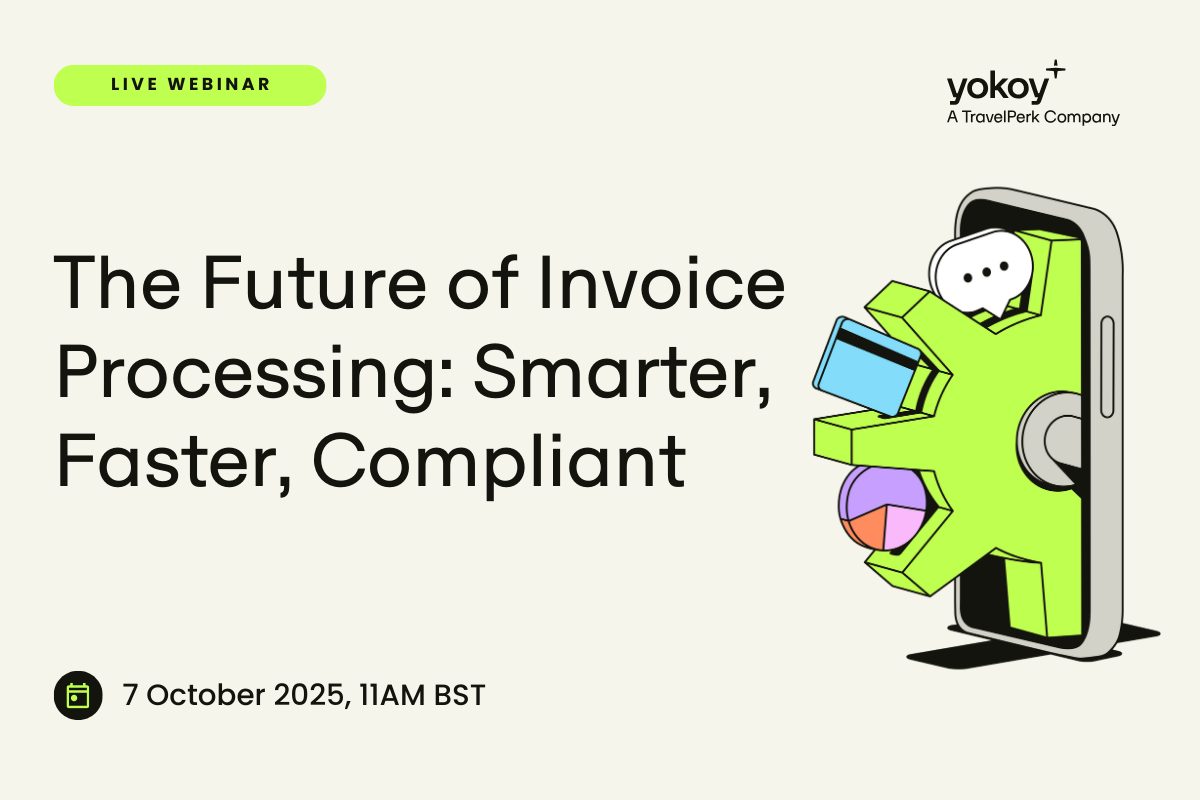Home / CFOs and AI: A Guide to Smarter Tech Decisions
CFOs and AI: A Guide to Smarter Tech Decisions
- Last updated:
- Blog

A decade ago, the idea of finance teams using artificial intelligence (AI) sounded rather adventurous and more like science fiction than reality. Today, however, AI is reshaping the finance function, transforming expense management, forecasting, risk management, and financial decision-making at a pace no CFO can afford to ignore. From automating repetitive tasks to predictive analytics that provide real-time insights, AI is no longer just an emerging trend—it’s necessary for businesses looking to maintain a competitive edge.
A combination of market volatility, increasing compliance demands, and the constant pressure to enhance efficiency forces leaders to rethink their approach to strategy. Gone are the days of relying solely on spreadsheets and manual processes. AI tools now offer data-driven decision-making that improves accuracy, reduces human error, and unlocks new financial control and expense visibility levels for companies.
But despite the buzz around AI, not all solutions deliver real value. The challenge for CFOs lies beyond just using it—they need to know where AI creates the most impact. Choosing the right tools and how to ensure seamless integration with existing financial systems is a crucial part of using AI efficiently. From streamlining processes, enhancing risk management, or unlocking AI-driven insights—there is much to uncover that can make the life of finance teams and CFOs much easier.
Understanding the AI landscape
When going through digital transformations, AI is indispensable for finance functions, as they are driving automation, improving decision-making, and enhancing operational efficiency. To make data-driven decisions, CFOs must first understand the different types of AI and where it can deliver the most value in finance.
The different types of AI used in finance
CFOs must first understand the key technologies that power modern financial systems to leverage AI.
Machine learning (ML) is finance’s most widely used AI application. It analyses historical data to detect patterns, making it a powerful tool for financial forecasting, cash flow predictions, and fraud detection. Natural language processing (NLP) enhances data analysis by automating tasks like contract reviews, customer interactions, and invoice processing. Meanwhile, predictive analytics allows finance teams to anticipate market trends, reduce inefficiencies, and make more strategic decisions based on real-time data.
Beyond these applications, AI-driven algorithms help improve risk management and financial planning by ensuring regulatory compliance, automating tedious tasks, and reducing human error.
Where AI can help in finance
It is safe to say that AI is more than just an efficiency booster—it has proven to fundamentally reshape financial workflows, from forecasting and fraud detection to expense management and compliance.
AI’s impact is felt across every aspect of financial operations: In fraud detection, the software continuously monitors transactions, using real-time data to detect anomalies and minimise financial risks. In expense management, AI automates approvals, flags non-compliant expenses, and streamlines workflows, reducing time-consuming administrative processes. Financial reporting with AI provides real-time insights into expenditures and budgets. In risk management, AI models assess financial exposure, improve regulatory compliance, and strengthen financial controls. By integrating AI into financial planning, CFOs can optimise budgeting, cash flow, and overall financial strategies for sustainable growth.
Blog article
Automated Expense Reporting: Simplify Expense Tracking and Maximize Compliance
Automated expense reporting helps you simplify expense tracking, enforce compliance, and streamline your expense management workflows. See how it works.

Lars Mangelsdorf,
Co-founder and CCO
Evaluating AI for finance
For finance leaders, adopting AI-powered solutions is not just about staying competitive—it’s about making more intelligent, data-driven decisions that enhance financial operations overall. However, careful evaluation ensures that AI technology aligns with business objectives, regulatory requirements, and long-term growth strategies.
Use cases of AI for your company
AI is revolutionising finance by automating expense management, forecasting, and risk management. However, AI can only deliver real value if CFOs assess its alignment with business needs.
AI can be an integral part of finance teams, enhancing data security with a few clicks. Streamlined risk management with AI helps detect fraud, flag suspicious transactions, and ensure compliance with regulations in real-time. Automating workflows, like expense approval processes and the use of corporate cards, increases speed while maintaining policy adherence, reducing operational bottlenecks.
Likewise, AI enhances always-up-to-date expense visibility, allowing CFOs to analyse spending patterns and identify opportunities for cost reduction. It can also optimise other business areas, such as supply chain management, customer service, and recruitment.
When selecting AI tools, companies should consider integrating existing spend management systems, data security, and regulatory compliance. Companies can optimise operations, reduce risks, and stay competitive in a rapidly evolving landscape by choosing the right AI solutions.
Cost vs. long-term value of AI for finance
When adopting AI in finance, it is crucial to weigh the initial costs against the long-term value it can provide. The upfront investment may include software costs, integrating existing systems or training employees—the benefits often justify the expenditure.
Automating time-consuming tasks like data entry, expense approvals, and financial reporting can significantly reduce operational costs. This enhances accuracy and gives finance teams more room for improvement in other areas.
AI provides instant, data-driven insights that improve forecasting and support informed decision-making. CFOs don’t need to rely on their gut feelings but instead, use actual data to provide evidence for their decisions. AI can also significantly lower other risks by continuously monitoring transactions, detecting expense fraud, and helping to stay compliant. This reduces the likelihood of financial risks and potential penalties, offering long-term security. At the same time, AI’s scalability means it adapts as the company grows, reducing the need for frequent upgrades.
How AI might help to close the talent gap
As financial operations become so much more complex than they used to be in the old days, businesses struggle to find skilled talent in data analysis, forecasting, and compliance. AI reduces reliance on manual work by streamlining data entry, transaction processing, and financial reporting, allowing teams to operate more efficiently with fewer resources.
Integrating predictive analytics and real-time insights is key in upskilling employees and shifting finance professionals toward higher-value tasks like strategic planning and proactive risk mitigation. Rather than replacing jobs, AI enhances roles, encouraging a shift from repetitive work to analytical and decision-driven responsibilities.
With AI-driven efficiency, businesses can maintain high-performance finance functions despite talent shortages. Companies that embrace AI for automation and workforce development will be better positioned to attract and retain finance professionals while ensuring long-term growth and resilience.
Adoption roadmap: From strategy to execution
Implementing AI into finance teams is not just about acquiring some technology—it requires a well-defined roadmap to ensure that AI adoption drives measurable business value. To integrate AI-powered solutions effectively, CFOs must take a structured approach that aligns with their organisation’s objectives, existing finance function, and long-term strategy.
Step 1: Use cases of AI: Finance leaders should identify inefficiencies in financial operations, focusing on time-consuming, error-prone, and data-heavy processes. Automating repetitive tasks like data entry, approvals, and compliance checks can result in accuracy and cost savings.
Step 2: Choosing the right tools: Business goals must align with AI tools to ensure effective data-driven decision-making. CFOs should prioritise AI solutions that comply with regulations, integrate seamlessly, provide AI-driven insights, and remain scalable for future business needs.
Step 3: Integration of AI with company tech stack: A well-planned deployment strategy involving collaboration between finance, IT, and compliance teams ensures AI solutions process real-time data and align with company-wide financial policies.
Step 4: Measuring success: CFOs should define KPIs that measure efficiency gains and improvements in financial decision-making to assess AI’s impact. Tracking metrics like manual processing time reduction, cash flow prediction accuracy, and cost optimisation ensure continuous AI refinement.
Yokoy Expense
Manage expenses effortlessly
Streamline your expense management, simplify expense reporting, and prevent fraud with Yokoy’s AI-driven expense management solution.

How Yokoy's AI helps CFOs make better financial decisions
Financial operations seem to get more complex every day. With AI-driven solutions like Yokoy, you can have strategic advantages by enhancing decision-making, improving operational efficiency, and avoiding non-compliance.
Seamless integration of Yokoy’s AI power with existing financial systems can help your company get on the right track and drive long-term business success.
Expense management automation
Manual expense management can be time-consuming, prone to errors, and resource-heavy. Finance teams need a solution that seamlessly eliminates these challenges. Yokoy simplifies this process using machine learning to automatically categorise expenses, detect duplicates, and flag policy violations in real time. This speeds up approval workflows and frees resources for other financial tasks.
Yokoy also includes corporate card solutions that help your company monitor actual expenses worldwide. The platform smoothly integrates ERP systems and accounting software, enhancing workflows and helping finance teams better manage expenses, budgeting, and cost control.
Fraud detection and compliance
Mitigating financial risks through smart expense management can reduce fraudulent transactions and non-compliant expenses. Yokoy’s AI-driven system identifies fraudulent patterns early, helping prevent costly financial misconduct or fines.
Yokoy’s AI is efficient because it continuously analyses financial data and detects anomalies, duplicate claims, or unusual spending in real time. The platform flags high-risk transactions with predictive analytics and alerts finance teams before losses occur. Yokoy helps ensure compliance by aligning all expenses and transactions with internal policies and external regulations. This gives you and your team more confidence in making decisions.
Predictive analytics for forecasting
Accurate forecasting is vital for cash flow management and business planning. While traditional methods mostly rely on static spreadsheets, Yokoy enhances forecasting with AI-driven predictive analytics, providing projections based on current financial trends.
By analysing large datasets, Yokoy can predict future expenses, identify spending patterns, and optimise budgeting. This helps anticipate cost fluctuations and identify areas for spending optimisation. Now, you can proactively use AI-powered forecasts to make financial decisions.
Financial control and visibility
Maintaining financial control is essential for CFOs to ensure sustainable business growth. Yokoy provides your finance team with complete expense visibility. This helps your organisation track costs, optimise budgets, and ensure transparency in corporate spending.
Financial data are visible for you and your team in real-time and help identify inefficiencies and potential cost-saving opportunities. Yokoy’s AI systems centralise all financial transactions, giving your finance team a clear overview of company-wide expenses, ensuring better cash flow management, and optimising financial reporting.
By providing actionable insights into spend optimisation, you can set smarter financial policies, track financial performance against key objectives, and ensure that spending aligns with your business goals. You can gain a data-driven decision-making framework that provides long-term financial health.
Next steps
AI is reshaping how CFOs streamline expense management, enhance fraud detection, and make smarter, data-driven decisions. Book a demo today to experience firsthand how AI-powered automation can optimise your financial operations, reduce inefficiencies, and give you complete control over your company’s spending.
In this article
See intelligent spend management in action
Book a demoRelated content
If you enjoyed this article, you might find the resources below useful.


